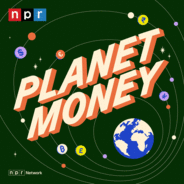There's an estimated $195 billion of medical debt in America. But just because a medical bill comes in the mail doesn't mean you have to pay that exact price. In this special episode from our friends at Life Kit, you'll learn how to eliminate, reduce or negotiate a medical bill.If you liked this episode, you can check out more Life Kit here. They have episodes on how to choose a bank, and how to save money at the grocery store.This episode of Life Kit was produced by Sylvie Douglis. Their visuals editor is Beck Harlan, and their digital editor is Danielle Nett. Meghan Keane is their supervising editor, and Beth Donovan is their executive producer.Help support Planet Money and get bonus episodes by subscribing to Planet Money+ in Apple Podcasts or at plus.npr.org/planetmoney.Learn more about sponsor message choices: podcastchoices.com/adchoicesNPR Privacy Policy

Wirtschaft
Planet Money Folgen
Wanna see a trick? Give us any topic and we can tie it back to the economy. At Planet Money, we explore the forces that shape our lives and bring you along for the ride. Don't just understand the economy – understand the world.Wanna go deeper? Subscribe to Planet Money+ and get sponsor-free episodes of Planet Money, The Indicator, and Planet Money Summer School. Plus access to bonus content. It's a new way to support the show you love. Learn more at plus.npr.org/planetmoney
Folgen von Planet Money
355 Folgen
-
Folge vom 31.07.2023Tackle your medical debt with Life Kit
-
Folge vom 28.07.2023Did two honesty researchers fabricate their data?Dan Ariely and Francesca Gino are two of the biggest stars in behavioral science. Both have conducted blockbuster research into how to make people more honest, research we've highlighted on Planet Money. The two worked together on a paper about how to "nudge" people to be more honest on things like forms or tax returns. Their trick: move the location where people attest that they have filled in a form honestly from the bottom of the form to the top.But recently, questions have arisen about whether the data Ariely and Gino relied on in their famous paper about honesty were fabricated — whether their research into honesty was itself built on lies. The blog Data Colada went looking for clues in the cells of the studies' Excel spreadsheets, the shapes of their data distributions, and even the fonts that were used.The Hartford, an insurance company that collaborated with Ariely on one implicated study, told NPR this week in a statement that it could confirm that the data it had provided for that study had been altered had been altered after they gave it to Ariely, but prior to the research's publication: "It is clear the data was manipulated inappropriately and supplemented by synthesized or fabricated data." Ariely denies that he was responsible for the falsified data. "Getting the data file was the extent of my involvement with the data," he told NPR.Help support Planet Money and get bonus episodes by subscribing to Planet Money+ in Apple Podcasts or at plus.npr.org/planetmoney.Learn more about sponsor message choices: podcastchoices.com/adchoicesNPR Privacy Policy
-
Folge vom 26.07.2023Summer School 3: Accounting and The Last SupperUsually, the first class that an MBA student takes is accounting. That involves, yes, equations and counting widgets...but it's more than that. Inside the simple act of accounting is a revolutionary way of thinking not just about a business, but about the world. A universe where all the forces are in balance. Accounting gives you a sixth sense–one that can help you determine whether your business will survive or fail.In this class, you'll learn the basics of accounting, and uncover its origins. We'll introduce you to the man who helped it spread around the world. He was a monk, a magician, and possibly the boyfriend of Leonardo da Vinci.Is accounting... sexy?Yes. Yes it is.Find all episodes of Planet Money Summer School here.This series is hosted by Robert Smith, and produced by Max Freedman. Our project manager is Julia Carney. This episode was edited by Sally Helm and engineered by Robert Rodriguez. The show is fact-checked by Sierra Juarez. Planet Money's executive producer is Alex Goldmark.Help support Planet Money and get bonus episodes by subscribing to Planet Money+ in Apple Podcasts or at plus.npr.org/planetmoney.Learn more about sponsor message choices: podcastchoices.com/adchoicesNPR Privacy Policy
-
Folge vom 21.07.2023Planet Money Paper ClubWe here at Planet Money love economics papers. And that is also the case for so many of the economists we speak with. For them, new research can explain something they have always wondered about, or make them see something they have never noticed before. And it inspires their own work. So, to bring that same sense of discovery to you, the listener, today we are dedicating our show to a special experiment. A new way to share some of the most fascinating, clever and surprising economics papers in a segment we're calling: The Econ Paper Club.On today's show, we read the econ papers so you don't have to. We take a joyous romp through some of the most fascinating ideas floating around economics right now. And we find that some of those fascinating ideas are about some of the biggest things in life: the careers we choose, the expectations that come with parenting and what one eminent economist calls 'greedy jobs.' This episode was hosted by Erika Beras and Kenny Malone. It was produced by Sam Yellowhorse Kesler and James Sneed. It was edited by Molly Messick. It was fact-checked by Sierra Juarez, and engineered by Robert Rodriguez. Alex Goldmark is our executive producer.Help support Planet Money and get bonus episodes by subscribing to Planet Money+ in Apple Podcasts or at plus.npr.org/planetmoney.Always free at these links: Apple Podcasts, Spotify, Google Podcasts, NPR One or anywhere you get podcasts.Find more Planet Money: Facebook / Instagram / TikTok / Our weekly Newsletter.Learn more about sponsor message choices: podcastchoices.com/adchoicesNPR Privacy Policy
